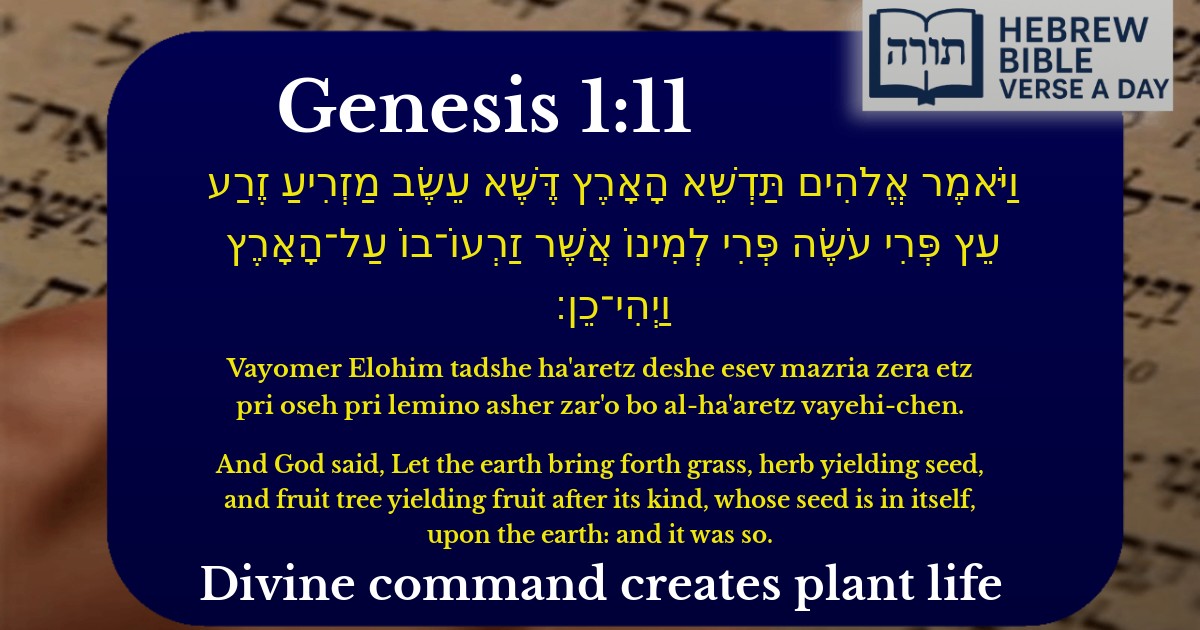Join Our Newsletter To Be Informed When New Videos Are Posted
Join the thousands of fellow Studends who rely on our videos to learn how to read the bible in Hebrew for free!
Hebrew Text
וַיֹּאמֶר אֱלֹהִים תַּדְשֵׁא הָאָרֶץ דֶּשֶׁא עֵשֶׂב מַזְרִיעַ זֶרַע עֵץ פְּרִי עֹשֶׂה פְּרִי לְמִינוֹ אֲשֶׁר זַרְעוֹ־בוֹ עַל־הָאָרֶץ וַיְהִי־כֵן׃
English Translation
And God said, Let the earth bring forth grass, herb yielding seed, and fruit tree yielding fruit after its kind, whose seed is in itself, upon the earth: and it was so.
Transliteration
Vayomer Elohim tadshe ha'aretz deshe esev mazria zera etz pri oseh pri lemino asher zar'o bo al-ha'aretz vayehi-chen.
Hebrew Leining Text
וַיֹּ֣אמֶר אֱלֹהִ֗ים תַּֽדְשֵׁ֤א הָאָ֙רֶץ֙ דֶּ֗שֶׁא עֵ֚שֶׂב מַזְרִ֣יעַ זֶ֔רַע עֵ֣ץ פְּרִ֞י עֹ֤שֶׂה פְּרִי֙ לְמִינ֔וֹ אֲשֶׁ֥ר זַרְעוֹ־ב֖וֹ עַל־הָאָ֑רֶץ וַֽיְהִי־כֵֽן׃


The Command for Vegetation
The verse (Bereishit 1:11) describes Hashem's command for the earth to produce vegetation. Rashi explains that the term "תַּדְשֵׁא" (tadshe) implies a divine decree for the earth to be covered with greenery. The Midrash (Bereishit Rabbah 5:9) elaborates that this command was not merely for immediate growth but established the natural order where vegetation would perpetually regenerate.
Categories of Vegetation
The verse specifies three categories of plant life:
Divine Precision in Creation
The phrase "לְמִינוֹ" (lemino, "after its kind") emphasizes that each species was created with distinct characteristics. The Sforno highlights that this demonstrates Hashem's wisdom in designing a balanced ecosystem where each plant fulfills its unique role. The Rambam (Moreh Nevuchim 2:30) further explains that this order reflects the unchanging laws of nature established by the Creator.
Seed as a Mechanism of Continuity
The phrase "אֲשֶׁר זַרְעוֹ־בוֹ" (asher zaro-bo, "whose seed is in itself") underscores the self-sustaining nature of plant life. The Malbim explains that this design ensures that vegetation can reproduce independently, fulfilling the divine command to "be fruitful and multiply" in its own way.
Fulfillment of the Command
The concluding words "וַיְהִי־כֵן" (vayehi-chein, "and it was so") signify the immediate and perfect execution of Hashem's will. The Midrash Tanchuma (Bereishit 5) teaches that this phrase appears throughout Creation to show that everything came into existence exactly as Hashem decreed, without deviation.